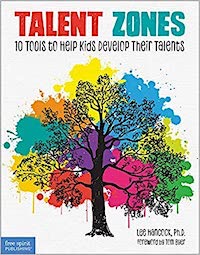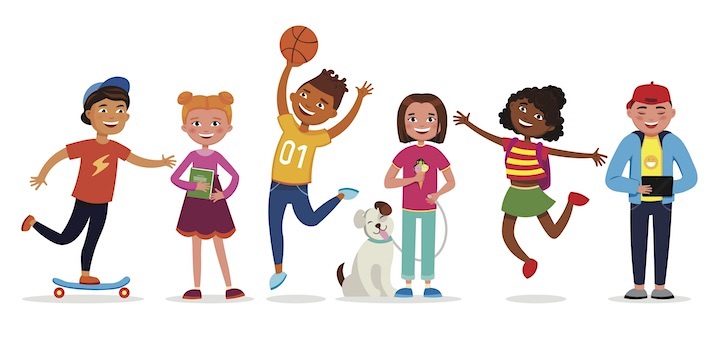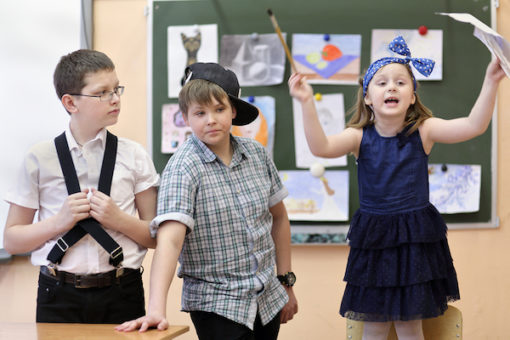3 Tools to Help Develop the Talents in Every Kid
By Dr. Lee Hancock

Adults identify a small percentage of kids as “talented” at an early age and, by omission, unconsciously identify the others as “not talented” – with no proof that kids identified as talented when young will become talented adults, or conversely that kids identified as not talented will not become talented adults.
We pour resources into talent development programs while often relegating the unselected to lesser learning environments, where they fend for themselves and either develop their potential or don’t.
As an educator, performance psychology coach, and parent, I have worked with talented individuals of all ages and in multiple arenas – from kindergarten classrooms to the Olympics, from high-level young athletes to students in “at-risk” programs.
I have also worked with youth talent identifiers and talent developers (teachers, coaches, and leaders) in music, sports, and academic programs. And in each of these environments, talent – special skill or ability – has emerged.
What intrigues me about talent is the idea that talent is innate yet built. We – as educators, coaches, and other invested adults – have the opportunity and the responsibility to help more kids build, strengthen, and explore their innate talents. And the choice to label kids has profound consequences for them – both positive and negative – early on in school, sports, and the arts.
We need to redefine the word talent
The “talent” label has too much power. What happens when children are not labeled as talented? Some children are able to embrace the untalented label; they recognize their weaknesses and work on strengthening those areas. Or if they’re lucky enough to have a comfortable socioeconomic status or attentive adults in their corner, they get lots of other chances.
But some kids don’t have any of these assets. What of those kids? Kids, like all people, are works in progress. And kids count on adults to assist them in this work, to help them develop who they are.
We adults owe it to kids to not let labels and other adult constructs limit them. For the most part, kids are just chugging along trying to learn and get better at stuff. Then at some point, adults label kids for pragmatic reasons. But is that the best approach? Adult labels may energize some kids, but they may redirect or derail the progress of other kids. We need a new approach to talent that serves the children, not the adults.
Talent is innate ability that can be improved
The talent that kids bear needs to be guided and assisted as it develops over time. In other words, it is a process.
Helping children develop their talent is about balancing failures and successes. It means keeping an open mind. Children push boundaries to discover and develop their abilities. When we see them act out or make problematic choices, we need to help them correct their behavior or learn how to make better choices without squashing their spirit.
Talent is a journey, not a destination – and kids who are on this journey deserve the opportunity to get there, wherever their “there” is.
So how can we develop talent in all kids? We can use evidence-based, developmentally appropriate strategies that I call Talent Development Zones (TDZs). These TDZs transform talent concepts and research into practical strategies you can use. Here are a few:
1. Embrace failure as an opportunity
Kids fail all the time. They might get bad grades, might not make the team or program or play they were striving for, might mess up on the field or onstage. It hurts. And yet, failure is so good for kids. They don’t have to like it. But if they think about their failure, learn from it, and go after their goal again, it becomes an opportunity.
One way to help kids see failure as an opportunity is to emphasize working hard over being the best. Let’s be clear: being the best isn’t bad. But not everyone can be the best. And if it is the only thing children are focused on, and there’s no attention to improving, then we have a problem.
After all, what happens when a kid isn’t the best – or isn’t always the best? Do they quit, or can they keep on keeping on? When kids fail – and when they succeed – adults should emphasize and reward their hard work.
Rewarding kids for their effort offers them autonomy and a bit of control over what is going on, and it deemphasizes comparisons and competition with other people. Here are some examples of adults emphasizing effort:
● A child comes home with a grade that isn’t an A. Find out if they’ve given their best effort and if so, reward them for that. If they haven’t, talk about why not and see how they might feel motivated or supported to work harder – or smarter – next time.
● A child has lost a game but has given their all. Praise them for that.
● A child gets a score of 94 in a piano contest while a friend gets a 98. The child is upset. Try to find out why the child is upset. If it is because they got a lower score than their friend, take the emphasis off the friend and help the child focus on self-improvement instead.
2. Provide opportunities for deep, deliberate practice
It takes lots of practice to get good at something. Depending on what you read, the magic amount of practice is ten years, ten thousand hours, ten thousand repetitions, or some other variation of the number ten.
But these numbers aren’t magical, and they aren’t rules; they are just guesses. And quality is just as important as quantity. Doing something for a certain number of hours or repetitions doesn’t mean you are automatically getting good at it. Talent requires deep, deliberate practice.
► Ensure focused training instead of participation. If kids want to improve their skills, they must focus on the quality of the tasks they are doing as opposed to simply the quantity of time they are putting into the endeavor.
► Don’t confuse activity with accomplishment. Kids should understand that just because they put in time doesn’t mean they will improve.
● Kids should have an idea of what they want to improve and how they want to improve it and move toward that idea deliberately.
● Kids can write it down. Sometimes writing down goals makes them easier to shoot for—and it helps kids hold themselves accountable.
► Focus on quality versus quantity. The goal for kids should be on the feel and the details of the skill, not simply putting in a certain amount of time or repetitions. If kids make mistakes, don’t worry. It’s effort toward quality – not perfection – that counts.
► Ensure opportunities for other endeavors if kids want them, and offer breaks if they don’t.
● Provide opportunities for other activities, subjects, or sports.
● Provide opportunities for breaks.
● Give kids reasons and real-life examples as to why variety and breaks are a good idea.
3. Foster in kids a love for their endeavors
Doing things because they want to, not because they have to, allows kids to improve, persist, enjoy, and create as they develop their talents. To create an environment that fosters in kids a love for their endeavors, adults need to:
► Set self-referenced success criteria. When kids put themselves out there as you are asking them to, at some point they will struggle to hit a target. If you tell them over and over, “This is how we define success; look at how you are improving; if you aren’t satisfied, how can you work to improve?” you can help them feel competent at the task. Feeling competent sometimes involves failures – and that’s okay.
► Call attention to data that show improvement. Use evidence to help kids develop a gradual sense of how good they are getting. This slow processing and realizing they are improving is a great motivator. It is the number one way to build confidence as well.
► Ask instead of tell. When kids are practicing a skill, if you ask them what the right thing to do is (instead of telling them what to do), this gives them a chance to think things through and choose an answer for themselves. When kids are able to choose an answer or an option, it’s very motivating.
We all have talents we can develop
I propose a working definition of talent in children that not only allows people to view talent as a journey but also provides a vision of talent as a journey for all kids, not just some. This working definition should tell adults, “Hey, keep an open mind. Help those kids who’ve been told they’re untalented figure out how to develop to their full potential.”
Stressing the idea that talent is a journey should also tell children that the pursuit of talent is talent itself. Talent is what EVERY child bears and carries and brings forth over time.

Dr. Hancock earned his Master’s and Ph.D. from Arizona State University and is a tenured professor in kinesiology at California State University Dominguez Hills. Most importantly, he is a dad of three high-energy, competitive, caring boys. He lives in Los Angeles, California.































